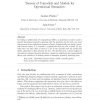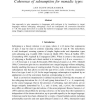ENTCS
2008
15 years 2 months ago
2008
In seeking a unified study of computational effects, in particular in order to give a general operational semantics agreeing with the standard one for state, one must take account...
116
click to vote
IWFM
2003
15 years 3 months ago
2003
We outline a possible logic that will allow us to give a unified approach to reasoning about computational effects. The logic is given by extending Moggi’s computational λ-cal...
117
click to vote
CAAP
1990
15 years 6 months ago
1990
One approach to give semantics to languages with subtypes is by translation to target languages without subtyping: subtypings A 6 B are interpreted via conversion functions A B. ...
116
click to vote
CSL
2009
Springer
15 years 8 months ago
2009
Springer
We define an “enriched effect calculus” by extending a type theory for computational effects with primitives from linear logic. The new calculus, which generalises intuitionis...
107
click to vote
ICFP
2006
ACM
16 years 2 months ago
2006
ACM
Monads are widely used in Haskell for modeling computational effects, but defining monads remains a daunting challenge. Since every part of a monad's definition depends on it...


